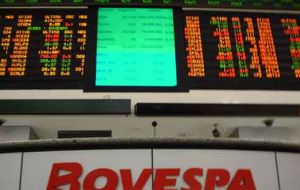MercoPress. South Atlantic News Agency
Brazil’s investment tax tumbles stock exchange and the Real
 Bovespa ready to propose alternatives calm markets
Bovespa ready to propose alternatives calm markets Brazil's stock market suffered one of its worst one-day plunges in three months and the currency sank after the government imposed a tax on foreign investments in local stocks and bonds. The Bovespa index of the Sao Paulo stock exchange dropped 2.88% to 65,303.11, after closing at its strongest level since June 2008 the previous session.
The decline in the index was the biggest since it lost 2.5% on August 17. The Real meantime slid 2.1% to 1.7547 per dollar, the lowest in two weeks.
Finance Minister Guido Mantega announced Monday the government would charge a 2% financial transactions tax on foreign investments in Brazilian stocks and fixed-income securities in a bid to prevent the country's currency from strengthening further.
But Bovespa also announced plans to press the Brazilian government for alternative ways to curb gains in the currency. The levy, higher than a 1.5% tax scrapped a year ago that didn’t cover stocks, will hurt Brazilian investors and small- and medium-sized companies, according to Carlos Kawall, chief financial officer of Sao Paulo-based BM&FBovespa.
“We need to do everything we can from now on, talking to the government, getting support from everyone who sees that this is something that is definitely faulty and could be altered,” Kawall, a former Treasury Secretary who served under Mantega in 2006, said during a conference call.
International investors, who account for about a third of Bovespa’s stock trading, will likely buy US depositary receipts, punishing smaller Brazilian companies who can’t afford the costs of listing overseas, Kawall said. The fact that money raised through ADRs is seen as direct investment and isn’t taxed, while local capital raising will be subject to the levy, is one of the “inconsistencies” in the regulation, he said.
Mantega said on Monday that the measure seeks to curb gains in the Real, which has strengthened the most of any major currency this year on the back of higher commodity prices, a credit rating upgrade from Moody’s Investors Service and forecasts for faster economic growth.
The tax will reduce the efficiency of Brazil’s capital markets and “divert” money needed to finance the country’s economic growth, according to a statement signed by BM&FBovespa and groups representing Brazil’s pension funds, publicly traded companies and investment banking industry.
“So who gets hurt? We get hurt and that’s what markets are suggesting today,” Kawall said on yesterday’s call. “Local small- and medium-cap companies get hurt because they cannot deal with the cost of issuing ADRs. The local investor gets hurt because they might have less liquidity here over time if this measure prevails”.




Top Comments
Disclaimer & comment rulesCommenting for this story is now closed.
If you have a Facebook account, become a fan and comment on our Facebook Page!